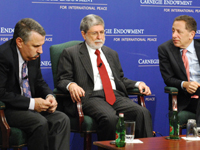Registration
You will receive an email confirming your registration.
The rise of new powers in the developing world has already begun to reshape international relations, but the characteristics of any new international order remain unclear. In an event co-sponsored by the Carnegie Endowment and Foreign Policy magazine, Carnegie’s David Rothkopf hosted a discussion with Brazilian Foreign Minister Celso Amorim and New York Times columnist Thomas Friedman, two of Foreign Policy’s 100 Top Global Thinkers in 2010 and foremost experts on the rise of the developing world. Foreign Policy's Susan Glasser chaired the discussion, and Carnegie's Jessica Mathews introduced the speakers.
Key Moments and New Alliances
Amorim explained how emerging powers have increasingly worked together to articulate the interests of the developing world. New groups have emerged, such as the BRICs (Brazil, Russia, India, and China), the BASICs (Brazil, South Africa, India, and China), and two different G-20s.
- A Proposal from South Africa: Amorim recounted that, on his second day in office, the South African foreign minister proposed a new alliance of developing countries. At the time they decided to form a new group consisting of Brazil, South Africa, and India, three large multi-racial democracies on three different continents.
- Cancún and the G-20: At the 2003 Cancún meeting of the World Trade Organization (WTO)’s Doha Round, Brazil, South Africa, and India led developing nations in creating a G-20 group. This was the first time the developing world united to reject an agreement that would have served only the interests of the United States and Europe, Amorim explained.
- A New G-20: Since the financial crisis, the G-8 has been replaced by a G-20 made up of major economies, a recognition of the growing importance of new powers. Such a move would have been inconceivable even five years ago, Amorim asserted.
- Copenhagen Climate Conference: In Copenhagen, the most intense final negotiations were between the United States and the BASIC countries, Amorim noted. The Europeans were largely excluded.
- Negotiations with Iran: Brazil and Turkey, demonstrating their growing clout, negotiated an agreement with Iran to exchange its low-enriched uranium for nuclear fuel. This move threatened to disrupt the U.S. push for tougher United Nations sanctions against Iran.
Productive Players?
Developing nations have demonstrated their ability to block initiatives from the developed world, but disagreements remain over whether they can also produce constructive alternatives.
- Lack of Agreements: Developing countries have garnered attention on issues like trade, climate change, and Iran, but they haven’t achieved concrete results, Friedman argued. The Doha Round negotiations collapsed, the Copenhagen Conference failed to reach an important climate agreement and Brazil and Turkey’s enrichment deal with Iran was never implemented. Amorim countered that even if these actions didn’t lead to lasting agreements, they showed that alternative diplomatic paths exist. Ultimately, they proved that the United States can no longer dictate policy to the world, he noted.
- Shaping the Debate: The actions of developing countries in international fora have changed the terms of global debates, Amorim contended. When the WTO finally reaches a new trade agreement, it will be more balanced toward the needs of the developing world. He added the success of developing nations in reforming the IMF quota system to gain more votes in the organization means their voices can no longer be ignored.
- New Negotiators: Brazil and other emerging powers can negotiate with countries that the United States and Europe are unable to talk to, such as Iran and Cuba, added Amorim. Though Brazil was seen as undermining the United States by negotiating with Iran, Amorim argued it was actually following a request by President Obama to President Lula to help convince Iran to respond to international overtures.
Opportunities and Challenges of Increased Participation
As emerging powers increase their presence and influence on the global stage, the new balance of power offers the potential for both greater inclusivity and more conflict and gridlock.
- Collective Action: As international fora such as the G-8 expand and developing countries push for permanent membership in the United Nations Security Council, serious concerns exist that increasing the number of players will decrease the potential for compromise. Any nation’s diplomacy depends on its ability to leverage a coalition for action, but there appears to be little hope of agreement on critical issues such as climate change, Friedman noted. Amorim countered that a Security Council of one member would be much more efficient, but more members bring greater legitimacy.
- Assuming Global Responsibility: If Western powers want the developing world to abide by international obligations, developing nations must have a seat at the negotiating table and a stake in the agreements, Amorim contended. Rothkopf argued, however, that developing countries, particularly China, are not yet ready to assume the leadership role they need to play.
Promoting Values in Foreign Policy
Although many analysts question the commitment of emerging powers to defending human rights and the liberal international order set up by the West, Amorim dismissed that concern.
- Dealing with Dictators: Friedman criticized Presidents Lula of Brazil and Erdogan of Turkey for raising their arms with President Ahmadinejad at the close of nuclear negotiations, shortly after widespread post-election repression in Iran. Amorim responded that it is important to negotiate even with enemies. He added that the United States also deals with dictators when they need military bases or trade deals.
- Defending Human Rights: Foreign policy would be easy if all countries agreed to be friends with everyone, but Friedman contended that despite contradictions in Western policies, the West holds to certain values and cannot ignore human rights concerns. Amorim responded that Brazil also promotes values, and that the United States often has double standards in its condemnation of human rights abuses. Ultimately, Amorim concluded, it is better to use international fora where all nations can be treated equally, such as the International Labor Organization or the United Nations Human Rights Council, to address human rights issues.
